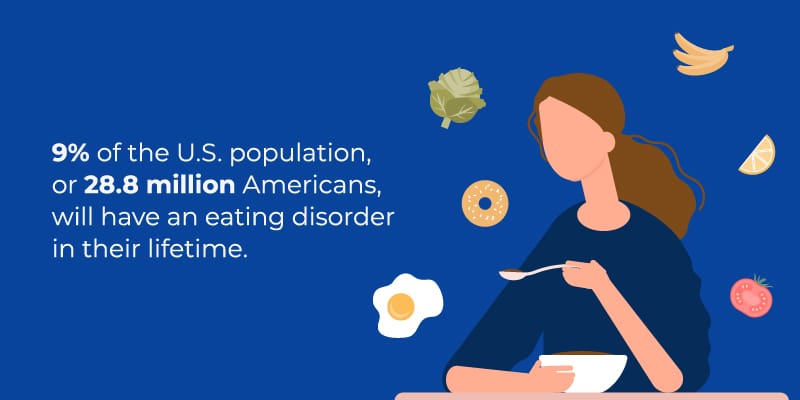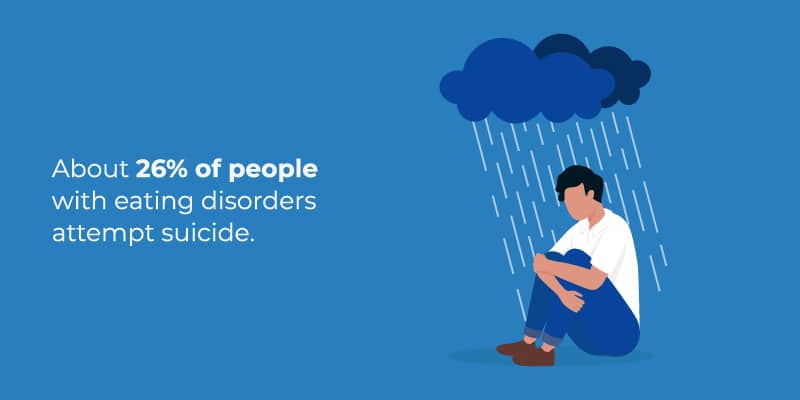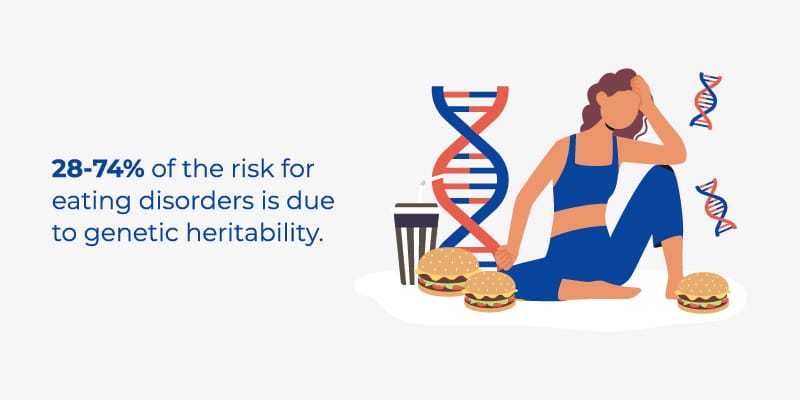Immersive Healing: The Role of Inpatient Eating Disorder Treatment
Learn more about different types of eating disorder treatment and how J. Flowers Health Institute can help you heal.
Table of Contents
Art Therapy
Understanding Eating Disorders
Eating disorders are conditions marked by an intense preoccupation with food and body weight. This leads to unhealthy behaviors and eating habits. People struggling with these disorders often have a distorted body image and go to extreme lengths to control their weight.
These disorders often involve both physical and emotional challenges. In order to manage these issues and begin the healing process, a comprehensive approach, such as inpatient eating disorder treatment is often beneficial.
What is an Eating Disorder?
Symptoms of Eating Disorders
Mild Symptoms
- Being overly concerned with dieting
- Exercising excessively
- Eating alone to avoid judgment
Moderate Symptoms
Moderate symptoms could include:
- Frequent dieting despite being underweight
- Obsession with calories and fat content of food
- A fear of gaining weight that impacts daily life
At this point, it’s often necessary to seek professional eating disorder treatment.
Severe Symptoms
Severe symptoms often indicate that an eating disorder has reached a critical level. These can include:
- Rapid weight loss or gain
- Feeling dizzy or fainting
- The absence of menstruation in women
Signs of an Eating Disorder
Types of Eating Disorders
There are several distinct types of eating disorders. Each type has unique characteristics, but all share the common thread of harmful eating behaviors and a focus on body weight or shape. Many of these types need eating disorder treatment to overcome.
Anorexia Nervosa
Anorexia nervosa is characterized by a severe fear of gaining weight, leading to self-starvation and excessive weight loss. Those with anorexia often view themselves as overweight, regardless of how thin they become.
A Closer Look at Anorexia Nervosa
Bulimia Nervosa
Bulimia nervosa involves periods of eating a large amount of food (binging), followed by behaviors to prevent weight gain (purging).
These behaviors include:
- Forced vomiting
- Excessive exercise
- The use of laxatives
Binge Eating Disorder
Binge eating disorder is marked by recurrent episodes of eating large quantities of food, often quickly and to the point of discomfort. Unlike bulimia, these episodes are not followed by purging, resulting in weight gain.
Other Specified Feeding or Eating Disorders (OSFED)
OSFED is a category for eating disorders that share some characteristics of the above disorders, but don’t meet all of the diagnostic criteria.
- Night eating syndrome
- Purging disorder
- Avoidant/restrictive food intake disorder (ARFID)

Risk Factors for Developing Eating Disorders
While it is possible for anyone to develop an eating disorder, there are various risk factors that make a person more susceptible to this mental health challenge. These risk factors will be discussed below.
Biological
Certain biological factors can increase the risk of developing eating disorders. These include:
- Hormonal changes
- Nutritional deficiencies
- Irregularities in the structure or function of the brain
Psychological
Social and Cultural
Our society and culture influence our views on body image and beauty standards. The pressure to maintain a certain body shape or size can be overwhelming.
This pressure, combined with criticism about body weight or shape, can lead to the development of eating disorders.
Environmental
Genetic
Demographic Characteristics of Eating Disorders
Below are some demographic characteristics of eating disorders.
Age and Gender Distribution
Despite societal stereotypes, men and boys can and do suffer from eating disorders and often face additional stigma. This may deter them from seeking eating disorder treatment.
Prevalence Among Different Ethnicities
Eating disorders occur among people of all ethnic backgrounds. Historically, eating disorders were thought to primarily affect white individuals, particularly those from middle and upper socio-economic classes. But, recent studies indicate that people of color are similarly affected.6
Socioeconomic Factors
Eating disorders can impact people across all socioeconomic levels. Contrary to common belief, these disorders are not exclusive to people from wealthier backgrounds.
Factors such as food insecurity or financial stress can worsen eating disorders. Adequate access to resources, including comprehensive eating disorder treatment, is important across all income levels.
Physical Health Consequences
Some of the physical consequences of eating disorders will be detailed below.
Malnutrition
Malnutrition can:
- Leave you feeling weak and tired
- Interfere with cognitive abilities
- Impair your immune system
Metabolic Changes
Eating disorders can change the way your body uses food. This can slow down how you burn calories. This can make you feel cold, tired, and hungry all the time, even if you are eating regularly. This is your body’s way of trying to save energy.
Gastrointestinal Complications
Eating disorders can affect your stomach and intestines. They might cause problems like stomach aches, constipation, or bloating.
You might also have a hard time digesting food, which makes these problems worse. Eating disorder treatment can help to ease these issues.
Cardiovascular Problems
Eating disorders can also hurt your heart and blood vessels. This can make you feel dizzy or faint, especially when you stand up. You might also notice that your heart is beating too fast or too slow.

Mental Health Consequences
There are many mental health consequences to eating disorders. Often, these consequences need eating disorder treatment.
Depression and Anxiety
Depression and anxiety often walk hand in hand with eating disorders. If you’re dealing with an eating disorder, you might feel sad or hopeless, or you might worry a lot and feel tense.
This is not because you are weak, but because eating disorders and mood problems affect similar parts of the brain.7
Body Image Disturbance
Eating disorders can make it hard to feel comfortable in your own skin. You might:
- Obsess over numbers on the scale
- Focus on “flaws” that don’t exist
- Avoid looking in the mirror entirely
This can make you feel uncomfortable or even disgusted with your body. Eating disorder treatment aims to help you see your body as it really is and learn to love it.
Suicidal Ideation
Co-Occurring Disorders
Eating disorders are often accompanied by other mental health concerns, such as substance abuse, obsessive-compulsive disorder, and personality disorder.8
Eating disorder treatment can treat two problems at once, helping you to manage all your symptoms.
Treatment Options for Eating Disorders
Below are some eating disorder treatment options.
Psychotherapy and Counseling
Psychotherapy is a type of talk therapy and a key part of eating disorder treatment. In psychotherapy, you meet with a mental health professional who helps you understand your thoughts and feelings. You might work one-on-one with a therapist or in a group with others facing similar challenges.
Counseling sessions focus on your eating behaviors, but they can also address related issues like:
- Body image
- Self-esteem
- Family dynamics
Nutrition Education
Nutrition education is an essential part of eating disorder treatment. You’ll learn about the importance of good nutrition and how food can help you feel better physically and emotionally.
You and your dietitian or nutritionist will work together to create a meal plan that meets all of your nutritional needs.
This includes understanding:
- Which foods to eat
- How much to eat
- When to eat
Medication Management
You would work closely with your mental health team to decide if medication is a good option for you. They can also provide guidance and support when it comes to managing side effects or finding the right dosage.
Inpatient vs. Outpatient Eating Disorder Treatment
When deciding between inpatient and outpatient treatment for an eating disorder, it’s important to weigh the pros and cons of each option.
Which Option is Best for Me?
Inpatient treatment is often recommended for people with more severe symptoms or those who are at risk of medical complications.
This could also be a good choice if you have difficulty staying motivated or following through with your treatment plan on an outpatient basis.
Outpatient treatment might work for you if your eating disorder is not interfering with your daily life or if you have good support systems in place.
Treatment Intensity and Duration
Outpatient Intensity and Duration
Outpatient treatment allows for more flexibility in scheduling. You’ll visit the treatment center for therapy sessions a few times a week. You’ll be practicing your new healthy behaviors mostly on your own.
Outpatient treatment can last several months to a year or more, based on how much support you need.

The Immersive Environment of Inpatient Eating Disorder Treatment
24/7 Supervision and Support
In inpatient treatment, you have access to medical and therapeutic staff all day, every day. This can be helpful if you have a hard time managing your eating disorder on your own.
The constant presence of professionals provides immediate assistance during difficult times and ensures your safety.
Removal of Triggers and Distractions
Being in an inpatient eating disorder treatment center means you’re away from your everyday environment. This can help you focus on recovery and not get distracted by people, places, or activities that may trigger your eating disorder behaviors.
Intensive Therapeutic Engagement
You can expect to be in treatment for 8-10 hours a day. Frequent engagement with therapy helps equip you with new skills and coping strategies. It also keeps your eating disorder behavior in check, allowing for a more steady recovery process.
A Community That Understands
Inpatient treatment centers are made up of people who understand what it’s like to struggle with an eating disorder. You’ll be surrounded by peers in similar situations, which gives you the opportunity to form positive relationships during your recovery journey.
Critical Aspects of Inpatient Eating Disorder Treatment
Individualized Treatment Plans
Eating disorder treatment is not a one-size-fits-all approach. Instead, each patient gets a treatment plan that’s made just for them.
This plan takes into account your personal needs, goals, and situation. The plan can be adjusted as you progress in your recovery.
Regular Monitoring and Assessment
- Medical check-ups
- Mental health assessments
- Nutritional evaluations
It also allows for early intervention if any signs of relapse arise.
Targeted Nutritional Rehabilitation
This includes teaching you about healthy eating and helping you learn to listen to your body’s hunger and fullness cues. You may also receive nutritional supplements to help you reach a healthy weight.
Family Involvement and Education
They could join educational sessions or therapy meetings. The idea is to help them understand what you’re going through. With this understanding, they can provide the right kind of support at home, helping you to continue making positive changes.
Aftercare Planning and Transitioning
This can involve:
- Setting up outpatient therapy
- Helping you find a support group
- Making a plan for dealing with potential triggers in your everyday life
Maximizing the Benefits of Treatment
- Asking questions
- Sharing your feelings
- Taking part in therapy activities
Collaborative Therapeutic Relationship
A good relationship with your healthcare team makes a big difference in eating disorder treatment. This involves trust, respect, and communication.
You should feel comfortable discussing your fears and challenges with your team. Likewise, they are there to listen, provide guidance, and work with you to shape your recovery plan.
Openness to Change and Recovery
Recovery involves change, which can be scary at times. But, being open to changing old habits and embracing new ones can boost your progress in eating disorder treatment. This means accepting that it’s okay to let go of harmful patterns and adopt healthier ones, even if it’s uncomfortable at times.
Self-Care Practices
Self-care means taking time to look after your own well-being. This can include relaxing activities, gentle exercises, or simple acts like getting enough sleep.
Self-care helps you manage stress and nurtures a positive relationship with your own body. It’s a way of supporting your eating disorder treatment by maintaining good physical and emotional health.
Building a Support Network
You don’t have to face recovery alone. A strong network of supportive people can be a pillar in your eating disorder treatment. This can be family, friends, or a support group of people who’ve had similar experiences.
They can provide understanding, encouragement, and a listening ear when things get tough, enhancing your resilience throughout the treatment process.
Relapse Prevention and Long-Term Support
Below are some ways to prevent relapse after eating disorder treatment.
Identifying Early Warning Signs
Staying observant can help prevent a setback during eating disorder treatment. You might notice certain thoughts, feelings, or behaviors that tell you you’re in a difficult spot. This could be anything from increased stress to skipping meals.
Keeping a journal can help you track the signs you experience. Take into account your thoughts, emotions, and physical sensations. Your journal can provide insight into your condition as well as help you develop a plan for how to manage difficult moments.
Stress Management Techniques
Stress can be a trigger for eating disorder behaviors. Learning how to manage stress can be a part of your treatment. This might involve relaxation exercises like deep breathing, meditation, or yoga.
Learn to challenge negative thought patterns that arise during moments of stress. For example, instead of thinking “I’m a failure,” remind yourself that you are doing your best and you have the strength to cope with challenging situations.
It can help to have a few go-to activities that you use when feeling overwhelmed. This could be exercising, reading, listening to music, or watching your favorite show.

Receive the Help You Need at J. Flowers's Inpatient Program for Eating Disorders
If you or a loved one are struggling with an eating disorder or other mental health challenges, know that you are not alone. J. Flowers Health Institute is here to help you recover.
Overview of J. Flowers Health Institute
The J. Flowers Health Institute is a hub for comprehensive health evaluations. Led by Dr. James S. Flowers, our Houston-based institute blends a team of board-certified professionals in a distinctive bespoke environment.
We provide wellness programs that tackle a range of health challenges such as chronic pain, addiction, mental health issues, lifestyle struggles, and eating disorders.
Specialized Programs for Eating Disorders
J. Flowers Health Institute provides two main programs to address eating disorders: the Bespoke Stabilization Program and the Bespoke Wellness and Restoration Program.
Bespoke Stabilization Program
The Bespoke Stabilization Program focuses on achieving balance. If you’re struggling with an eating disorder, this program ensures you are in a stable condition to proceed to further treatment. It’s a starting point where medical and mental health professionals provide 24/7 care.
We work closely with you to observe and manage every aspect of your health, from medication needs to nutritional intake and sleep patterns. All of this is done in a one-on-one setting to ensure privacy and comfort.
Bespoke Wellness and Restoration Program
On the other hand, our Bespoke Wellness and Restoration Program is designed for recovery and improvement. Once you have stabilized, you will transition to this program, where the aim is to help you get better based on your unique needs.
Our team will create a treatment plan for you, which might involve managing mood symptoms, learning coping skills, or adopting a healthier lifestyle.
Reach Out and Begin Recovery Today
At the end of the day, you will feel empowered and have more control over your life. You can trust that our kind and knowledgeable team at J. Flowers Health Institute is there to provide guidance and support every step of the way.
Reach out for more information on our inpatient eating disorder treatment and other services.
Resources
- https://www.nationaleatingdisorders.org/learn/by-eating-disorder/osfed
- https://www.ncbi.nlm.nih.gov/pmc/articles/PMC3366171/
- https://www.verywellmind.com/perfectionism-in-anorexia-nervosa-1138391
- https://www.ncbi.nlm.nih.gov/pmc/articles/PMC3010958/
- https://www.medicalnewstoday.com/articles/313466
- https://www.ncbi.nlm.nih.gov/pmc/articles/PMC6382562/
- https://www.ncbi.nlm.nih.gov/pmc/articles/PMC5957512/
- https://onlinelibrary.wiley.com/doi/10.1002/eat.23687






